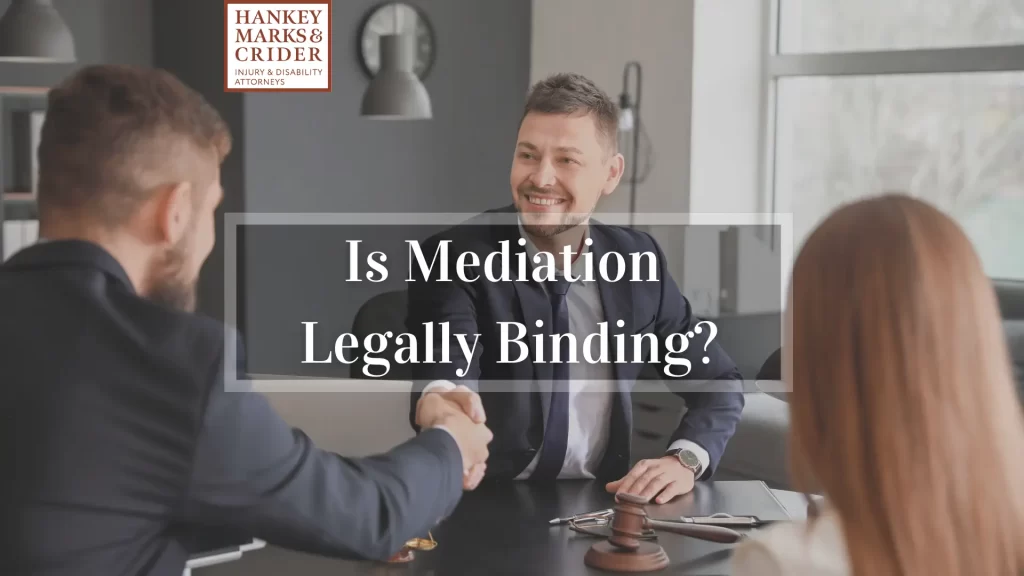
Mediation is a form of alternative dispute resolution (ADR) for legal claims. Another common form of ADR is arbitration. Parties to a lawsuit often use both as alternatives to litigating a dispute in court before a judge and jury. Most civil lawsuits use some form of alternative dispute resolution and settle without going to trial. Mediation is legally binding only if both parties agree to terms.
In mediation, a neutral party tries to guide the parties to a settlement, acting as a mediator and facilitator rather than a decision-maker. Mediation allows parties to retain more control over the dispute-resolution process.
When you litigate a legal claim in a civil court, a judge or jury makes the final decision. The court issues an order that makes this decision legally binding on the parties. In mediation, any agreement between the parties is only legally binding if the court orders the mediation, the parties sign it, and the judge approves it.
Mediation as a Form of Alternative Dispute Resolution
Unlike arbitration, where parties present their cases to a neutral arbitrator for a legally binding decision, a mediator does not decide the case but attempts to facilitate the parties’ cooperation to help them resolve the case.
Forms of alternative dispute resolution, such as mediation, often help parties craft creative solutions with positive long-term results. A productive mediation session can empower parties and help them maintain their valuable personal and business relationships.
Mediation provides a safe environment for litigants to resolve disputed legal issues without forfeiting their right to litigate these issues if mediation does not result in a settlement agreement.
Does Mediation Mean Settlement
Upon the completion of mediation, one of three results typically occurs:
- Settlement
- No settlement but negotiations continue
- No settlement with no further negotiations
Failure to settle a dispute after one mediation session is not necessarily a negative result. Instead, consider it as the first step toward settlement. If you progress toward a settlement, you can consider a mediation session productive. Your attorney can help you capitalize on all the positive results from a mediation session to help you prepare for a subsequent session and move closer to a final, satisfactory resolution of your legal dispute.
A mediation session that does not yield results can make you reluctant and skeptical to continue the process. In this situation, you should never hesitate to restart mediation and continue negotiations. Typically, the mediator evaluates the case and gives an opinion about its expected resolution. After a failed mediation session, any party can solicit the mediator for this case evaluation.
When Is a Mediation Legally Binding?
 When parties negotiate and reach a settlement through mediation, they put the negotiated terms in a written agreement known as a settlement agreement. A mediated settlement becomes legally binding once the parties sign it and the judge approves it. Only after the parties sign the settlement agreement will the administrative judge assigned to the case approve it. The judge’s written approval has the same effect as a court order. When a settlement is binding, all terms contained within it are final.
When parties negotiate and reach a settlement through mediation, they put the negotiated terms in a written agreement known as a settlement agreement. A mediated settlement becomes legally binding once the parties sign it and the judge approves it. Only after the parties sign the settlement agreement will the administrative judge assigned to the case approve it. The judge’s written approval has the same effect as a court order. When a settlement is binding, all terms contained within it are final.
Such a settlement agreement is a binding contract enforceable in any Indiana state or U.S. district court with jurisdiction. Thus, attempting to negotiate new terms to the settlement agreement is impossible after mediation.
If a judge never approves the settlement agreement, then the mediation agreement is informal and will have no legal effect. It is important to follow all steps to get an agreement approved so that either party can enforce it. This creates repercussions for not keeping to the terms the parties agreed on. If a party violates any binding provisions of a settlement agreement, a court may enter sanctions, including attorney fees and payment of the entire cost of the mediation session.
If you want specific language in a settlement agreement, you must negotiate and finalize these provisions before the parties’ attorneys draft the final settlement agreement and the judge approves it. Once a judge signs an order approving the terms of a settlement agreement, it is legally binding.
Contact the Team at Hankey Marks & Crider for Help with Mediation
Filing a lawsuit is often a stressful, intimidating process. As a form of alternative dispute resolution, mediation offers litigants the chance to settle their legal disputes and bypass the formal, public process of a courtroom trial. The lawyers at Hankey Marks & Crider can help you find legal solutions through mediation and other forms of alternative dispute resolution. Call (317) 634-8565 or use our online contact form to arrange a free consultation.
Related posts
When is Mediation Not a Good Idea?
What Should You Not Say During Mediation?

